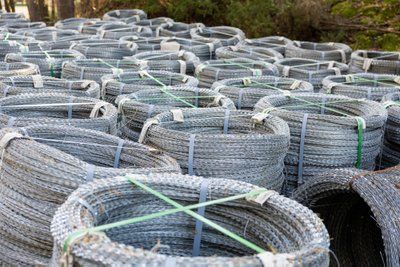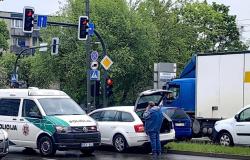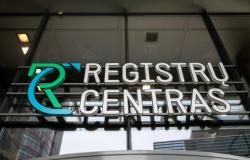The situation has changed dramatically over the past decade
Vaidas Sabaliauskas, director of the Lithuanian Defense Industry Association (LGSPA), says that the Lithuanian defense industry has been expanding and strengthening noticeably over the past 10 years. Lithuanian institutions do not have official statistics, but it is noticeable that not only the recognition of Lithuanian companies in foreign armies has increased, but also the turnover, which is increasing by tens or even hundreds of times.
“The increase in the turnover of most companies was partly determined by the needs of the Ukrainian armed forces, and we can be happy that the Ministry of National Defense of Lithuania contributed to support Ukraine with targeted acquisitions. Separate thanks must also be given to charity and support organizations, which also made significant purchases from Lithuanian companies in support of the Ukrainian Armed Forces. However, not all companies’ turnover grew due to exports to Ukraine, for example, a Lithuanian armored vest manufacturer exports almost all of its production to NATO countries. In general, the export geography of the Lithuanian defense industry covers all the continents of the world”, said V. Sabaliauskas.
After the increase in turnover, companies invest in the development of production, creation of innovations, development of new products and technologies. Ukrainian battlefields provide ideal conditions for testing and testing our products and technologies, improving them and creating new ones, so since the beginning of the war in Ukraine alone, at least 10 new products and even more components and IT solutions have been created in Lithuania.
Tomas Garuolis, general director of the Confederation of Lithuanian Industrialists (LPK), noted that a few years ago, the prevailing view was that Lithuania would get involved in NATO security operations and missions, allocate a part of the budget for defense and that would be enough for us to be safe. “At that time, without greater encouragement for the development of local industry, individual Lithuanian companies implemented their own defense industry initiatives: from optical devices – laser sights, thermal imagers – to drones, anti-drones and electronics”, said T. Garuolis about the current situation.
Lack of state support
Lithuanian manufacturers are famous in the world for the technologies they develop, including innovations in the military industry. According to V. Sabaliauskas, in the ecosystem of the Lithuanian defense industry, not only experienced companies with their own history operate successfully, but they are complemented by young, ambitious businesses. Currently, there is a great interest in the defense and security industry sector from companies that have not been active in the field of defense so far, and the desire to join the supply chains of the defense industry with their competences, resources, and infrastructure. This is demonstrated by the extremely large number of members of the Lithuanian Defense and Security Industry Association and the participation of companies in World Defense Exhibitions. There is also a great interest of companies in other various events related to the search for partners in the defense industry sector.
“Innovation in the defense industry comes naturally to stay competitive and superior in terms of revenue. It is regrettable that although the state has programs to promote innovation and encourage entrepreneurship, only a very small part of them are suitable for companies in the defense and security industries,” said the Director of LGSPA.
Urges companies to focus on defense
V. Sabaliauskas notes that there are still more obstacles to the development of the defense industry than opportunities: “The Arms and Ammunition Control Law of the Republic of Lithuania primarily emphasizes that weapons are dangerous and must be controlled, but completely forgets that the production of weapons or similar products is not only significant economic activity, but with a strong defense industry we could better ensure the security of our country.
It is also important to note that all over the world, the state takes care of the national defense industry, both by involving manufacturers in acquisitions for its military and by helping manufacturers find markets abroad. Unfortunately, this trend has not yet been seen in Lithuania. Sometimes it is disappointing when the officials responsible for acquisitions know less about the achievements of our country’s manufacturers than about their neighbors. If we could change this attitude, it would be a great victory.”
The general director of LPK says that the war caused by Russia in Ukraine painfully teaches us that we have a much greater need to direct economic activities to defense. We must be ready to secure resources, production, and economic functionality for as long as possible.

“Geopolitical circumstances affect the industrial agenda. Priority issues must be addressed: how to ensure effective provision of weapons, ammunition, equipment, food and the like to our soldiers. The entire Lithuanian industry can get involved and make a significant contribution: engineering industry companies can produce component parts of weapons and equipment, ammunition, the chemical industry can reorient itself to the production of ammunition components and the like. Companies that have already mastered serial or even mass production and quality control processes and technologies have a unique opportunity to reorganize and participate in the value chains of the defense industry that are strategically important for Lithuania at the moment,” explained T. Garuolis.
The prospects are encouraging
As the Government of Lithuania relaxes the arms control laws, the question arises – what awaits our arms manufacturers, will the situation improve and escalate even faster? V. Sabaliauskas singled out several reasons for the favorable prospects for the Lithuanian manufacturing industry:
1. The war in Ukraine consumes so many military resources that it is difficult for the existing defense industry to keep up with the demand.
2. The warehouses of the NATO countries’ armies were empty due to the established peace, so they will need to be filled twice as much due to the surrender of the available balances, and this may last for more than 10 years.
3. Smart technologies, artificial intelligence, robots, high technologies are increasingly being used for warfare, and we in Lithuania have the necessary competences and strong and motivated specialists for this. War, as unfortunate as it is, is an accelerator of world technological development, everything that is created for war will later be used in civilian life. The best example of this is drones. During the war in Ukraine, they have developed and will continue to develop so much that after the war, seeing drones every day in the air, on the street, in the fields or on the water will be as common as seeing an electric scooter on the street.

“In my opinion, we currently have specialists in all fields that the defense industry needs, including explosives development and production specialists, perhaps only with the development of the defense industry should their competencies be improved.” And the most important thing is that if the Lithuanian defense industry received more orders from the state, both to ensure the country’s security and to contribute to the aid in Ukraine, it would be even more capable of hiring, training and retaining these specialists”, said the interviewer.
T. Garuolis is the first to be happy with the positive developments and initiatives aimed at reducing excessive restrictions on the development of the defense industry: “Enablement of Lithuanian industry to produce here in Lithuania requires not only regulatory adequacy, but also a strategy, identified clear needs that guarantee long-term orders, access to capital, the promotion of internationality, active state industrial diplomacy is also important, and finally, the issue of specialists, especially engineering professions, remains extremely relevant”.
Tags: Defense industry Lithuania mentions great prospects misses important steps state









